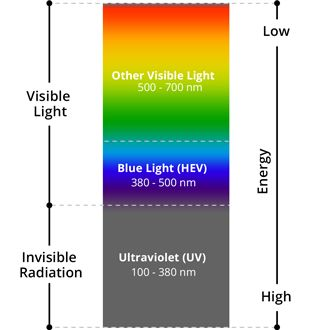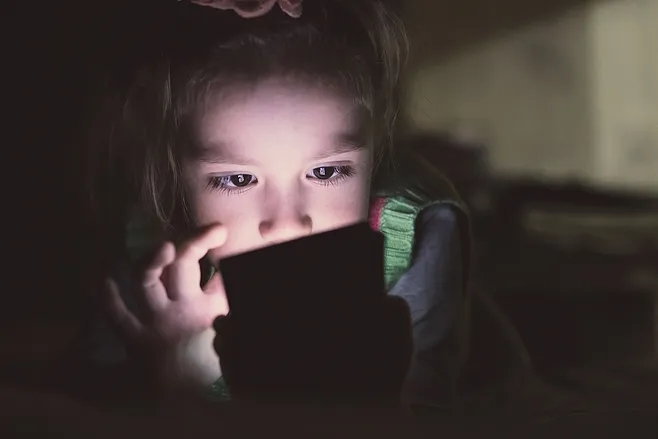I'm sure you've heard of blue-blocking glasses, right?
Many people need to work with mobile phones and computers for a long time, specially equipped with anti-blue light glasses; Many parents heard that this kind of glasses can prevent myopia, have prepared a pair for their children. Gradually, the blue - light - blocking glasses became "eye protection.
But is it really so amazing? What is blue light? Why guard against it? Can prevent blue light glasses prevent myopia really? Now look closely.
What is blue light? What's the effect on the eyes?
We often say that natural light, also known as sunlight, is composed of red, orange, yellow, green, blue, indigo, purple 7 different colors of light, among which "blue" is also known as blue light, its wavelength range between 380nm - 500nm.
Blue light affects the eyes in both ways:
Long-wave blue light in the wavelength range between 440nm and 500nm is favorable
It travels through the retina to the optic nerve, where it is transmitted to the hypothalamus to synthesize melatonin and serotonin, which can help you sleep, improve your mood, and improve your memory.
Short-wave blue light in the wavelength range of 380nm to 440nm is harmful
It can reduce sleep quality and even cause light damage to the retina.
In addition to sunlight, light from lights, from electronic screens, all of these sources have blue light distribution. At present, all qualified factory normal lamps and lanterns, the blue light energy is within the safe range, so the blue light issued by the daily use of lamps and lanterns, the impact on normal people's eyes is negligible.
The proportion of short-wave blue light in the screen light is higher than that in the sun, but the total energy is far less than that of the sun. The electronic products qualified for delivery are also not enough to cause damage to the retina.
At present, relevant experiments can confirm: large dose, long time continuous blue light irradiation, can lead to retinal photoreceptor cell apoptosis. But because of the low energy of blue light, which is distributed by screen light, and because most people use electronic screens for a reasonable amount of time, there have been no cases of blue light directly damaging the retina of the human eye.


What is the principle of anti-blue light glasses?
Blue-blocking glasses appear to the naked eye as if they are coated with a yellow film that reflects short-wave blue light through a coating on the surface of the lens. Or add blue-blocking factor to the lens substrate, so as to absorb blue and blue light.
According to the standard of "Technical Requirements for Light Health and Light Safety Application of Blue Light Protective Film", the light transmission ratio of long-wave blue light should be greater than 80%, which means that the beneficial blue light of long-wave blue light does not need to be protected. What blue blocking glasses really need to reflect and absorb is harmful blue light, known as short-wave blue light.
However, the quality of anti-blue light glasses on the market is uneven, some unqualified anti-blue light glasses, although can achieve the effect of anti-short-wave blue light, but also block the long-wave blue light; Therefore, when choosing anti-blue light glasses, we must pay attention to the transmission ratio of long-wave blue light.
Can prevent blue light glasses avoid myopic deepen?
There is no direct evidence that blue-blocking glasses prevent myopia.
We often say that long time to watch computer, TV, mobile phone, will cause vision loss, because long time to gaze at close objects will change the refractive system or the axis of the eye, thus affecting vision.
Therefore, for those who want to wear blue light blocking glasses to slow down the speed of myopia, there is no need to wear them.
Although blue light is not associated with myopia, it has a significant effect on dry eye patients. In 2016, Japanese dry eye expert Minako Kaido proved that reducing the exposure of short-wave blue light to the eyes can effectively improve dry eye symptoms in patients with dry eye. So people who spend a lot of time in front of a screen may feel comfortable wearing blue-blocking glasses.
These people recommend wearing it
(1) Suitable for screen workers with dry eye symptoms: because blocking short-wave blue light can improve the stability of dry eye patients' tear film, so blue-proof glasses can reduce the visual fatigue of screen workers.
(2) Suitable for people with macular degeneration: short-wave blue light for people with fundus disease penetration will be stronger than normal people, wearing anti-blue light glasses may have a certain effect.
③ Suitable for people who are engaged in special work, such as workers who fire glass and use electric welding: this kind of people may be exposed to large doses of blue light irradiation, so more professional protective glasses are needed to protect the retina.
It is not suitable for such people
① Not suitable for young children who want to prevent and control myopia: there is no report proving that wearing anti-blue light glasses can slow the development of myopia, and the background color of anti-blue light glasses is yellowish, which may affect children's visual development.
② It is not suitable for people who have requirements for color identification: blue light glasses will block blue light, exposing the complementary color of blue yellow, and the color of the screen will be distorted, so it may have a certain impact on the work of this kind of people.
Post time: Aug-26-2022

